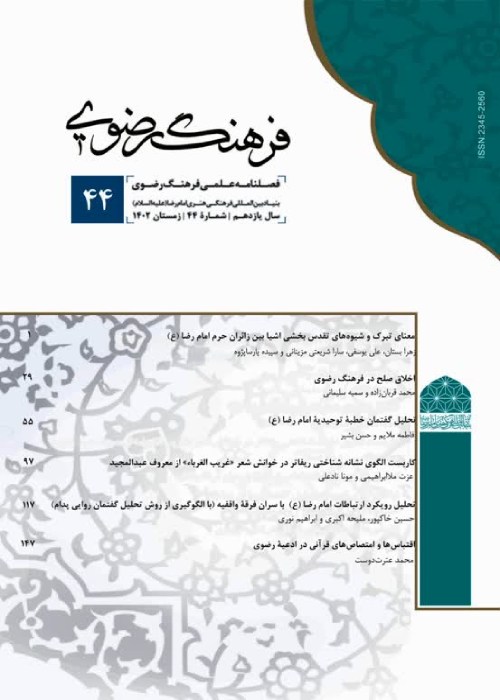Spiritual link of the Safavid kings with Imam Riḍā (as)
The appeal of the rulers, scholars, sufis and other sections of society to the Shiite Imams and other religious leaders was a historic and common tradition during the reign of the Safavid rulers who had Sufi descent and claimed to be attributed to the infallible Imams (as) flowed more prominently, because the disciples of Ghezelbash also believed in the Sufi tradition of the full-time disciple of the Safavid clergy, and had a strong belief in the greatness and miracles of the elders of the religion. Therefore, the present study seeks to answer this question: How did the Safavid kings have a spiritual connection with Imam Riḍā (as)? To answer, by examining issues such as the tradition of resorting to the Safavid kings to the clerics of the religious elders, including the eighth Shiite Imam, especially during military confrontations, it is estimated that various conditions such as the special position of Imam Reza (as) on the route leading to the often hostile Uzbek and Indian Gurkan states, as well as the permanent lack of direct access by the Safavid government to the shrines of Shiite Imams in the holy centers, had led to many religious acts and vows by the order of the Safavid king, which had various religious specialties for the Safavid rulers, including the blessings of prominent scholars and exiled political-military figures, as well as religious conflicts with Uzbek scholars, including holding prayer of Wali Nin’mat (The owner of blessings) in the presence of prominent scholars and deported political-military figures, and it also had religious disputes with Uzbek scholars. The present study, using historical research method and method of collecting library data from first-hand historical sources after describing and categorizing the developments related to the clerical miracles and religious practices of the Safavid rulers in the shrine of the eighth Shiites, analyzes and interprets these features and their effects on the political-military conditions of the Safavid government.
- حق عضویت دریافتی صرف حمایت از نشریات عضو و نگهداری، تکمیل و توسعه مگیران میشود.
- پرداخت حق اشتراک و دانلود مقالات اجازه بازنشر آن در سایر رسانههای چاپی و دیجیتال را به کاربر نمیدهد.


